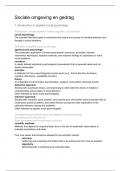Sociale omgeving en gedrag
1 Introduction to applied social psychology
Introduction: social problems, human cognition, and behavior
social psychology:
The scientific field that seeks to understand the nature and causes of individual behavior and
thought in social situations.
Definition of applied social psychology
applied social psychology:
The systematic application of social psychological constructs, principles, theories,
intervention techniques, research methods, and research findings to understand or solve
social problems.
construct:
A clearly defined individual (psychological) characteristic that is generally latent and not
directly observable.
principle:
A statement of how a psychological process works (e.g., foot-in-the-door technique,
cognitive dissonance, availability heuristic).
theory:
An integrated set of principles that describes, explains, and predicts observed events.
deductive approach:
Starting with a particular theory, and examining to what extent the theory is helpful in
understanding various types of social behavior.
(often followed by basic social psychologists).
inductive approach:
Starting with a specific social problem, and examining to what extent various theories help to
understand specific problems, and which theories provide the best explanation of the
particular behavior causing the problems.
(often followed by applied social psychologists).
Correspondence between basic and applied social psychology
Developing and testing theories
Basic and applied social psychology as science
scientific methods:
Methods that depend on empirical tests, that is, the use of systematic observations to
evaluate propositions and ideas.
Four core values that should be adopted for the scientific method:
- accuracy:
Gathering and evaluating information that is as precise and error free as possible.
- objectivity:
Minimizing bias in obtaining and evaluating data.
, - scepticism:
Accepting findings as accurate only to the extent that they have been verified over
and over again by the data.
- open-mindedness:
Accepting evidence as valid, even if the evidence is not consistent with one’s initial,
and perhaps strongly held, beliefs and theories.
Some important ethical concerns of precepts for social scientists:
Deception; informed consent; invasion of privacy; debriefing.
Goals of science
Basic and applied social psychologists are both motivated by four main goals of science:
- description:
Identifying and specifying the details and nature of a phenomenon.
- prediction:
Knowing what factors are systematically related to the phenomenon of interests.
- causality:
Identifying causes of a phenomenon.
- explanation:
Establishing why a phenomenon or relationship occurs.
Causes of behavior and cognitions
Both basic and applied social psychologists are primarily interested in understanding the
many factors and conditions that affect the behavior and thoughts of individuals. In general,
social psychologists take into account the following factors, as well as interactions between
these factors:
- individual factors:
Refer to intrapersonal characteristics and processes.
- social factors:
Pertain to the effect of the opinions and actions of other people on our behavior,
thoughts, and feelings.
- situational factors:
Reflect contextual factors that may affect our behavior and thoughts.
- cultural factors:
Refer to cultural values or norms that affect cognitions, feelings, and behavior.
- biological factors:
Pertain to the effect of biological processes and genetic factors on our behavior,
feelings, and thoughts.
Features of applied social psychology
The role of personal values
The use of multiple theories, intervention techniques, and research methods
Interdisciplinary research
Field settings
Social utility
Roles of applied social psychologists
Researcher
,Consultant
Policy advisor
2 The use of theory in applied social psychology
Introduction
The primary functions of theory in applied social psychology:
Understanding (U), solution (S), evaluation (E).
The role of theory in the field of applied social psychology
Theories, principles, and constructs
theory:
An integrated set of principles that describe, explain, and predict observed events.
principle:
A statement of how a psychological process works.
(e.g. compatibility principle: prescription from the TPB that attitudes, subjective norms,
and perceived behavioral control should be measured at the same level of specificity).
hypothesis:
A testable prediction derived from a theory.
model:
A framework that integrates theory and principles. Models typically describe multiple
processes, each linked through some type of causal sequence.
construct:
A clearly defined individual (psychological) characteristic that is generally latent and not
directly observable. (e.g. attitude).
rational choice theory:
A broad social science theory for human behavior that assumes that individuals are
motivated to act in ways that promote their self-interests and choose options with highest
benefits against lowest costs.
Social-psychological theories:
Social thinking
schemas:
The cognitive organization of a person’s past experiences, beliefs, and knowledge.
social cognition:
The study of how we process, store, and use information about other people.
-> attribution theory:
The tendency to give causal explanations for the behavior of ourselves and others.
- fundamental attribution error:
The tendency to overestimate the influence of personality variables and
, underestimate the influence of the situational variables when explaining other
people’s behaviors (and vice versa).
-> cognitive dissonance theory:
Theory that emphasizes the importance of consistency in a person’s attitudes, beliefs, and
behaviors.
-> Theory of Planned Behavior (TPB):
Explains behavior engagement resulting from intention, attitudes, subjective norms, and
perceived behavioral control.
According to this theory, the best predictor of an individual’s behavior is their intention to act,
which in turn is caused by three constructs:
- attitude
- subjective norms:
Refers to a person’s beliefs about what other people who are important to them think
they should do.
- perceived behavioral control:
A person’s beliefs about the extent to which the behavior is achievable by him or
herself.
Social influence
imitation:
The replicating of another’s action.
conformity:
The act of changing behavior to be consistent with a real or imagined social expectation.
-> compliance:
The act of changing behavior following a direct request.
-> obedience:
The act of changing behavior following an order.
-> elaboration likelihood model (ELM):
A framework that distinguishes between the central and peripheral routes to persuasion.
Social relationships
Many of the theories regarding social relationships require that we distinguish between ‘us’
(ingroup) and ‘them’ (outgroup) whenever we encounter a person or social situation.
-> biases:
Errors in judgment that result from the use of mental shortcuts.
-> stereotypes:
Generalized beliefs about a person based on his or her membership of a group (cognitive).
-> prejudice:
Unjustified negative attitude towards an individual based on his or her group membership
(affective).
motivation:
A person’s desire and willingness to act in a certain way.
-> discrimination:
Unequal or unfair behavior towards a person based on group membership (behavioral).
-> contact hypothesis:
The theory that bringing members of conflicting groups together will reduce prejudice and
improve intergroup relations.





